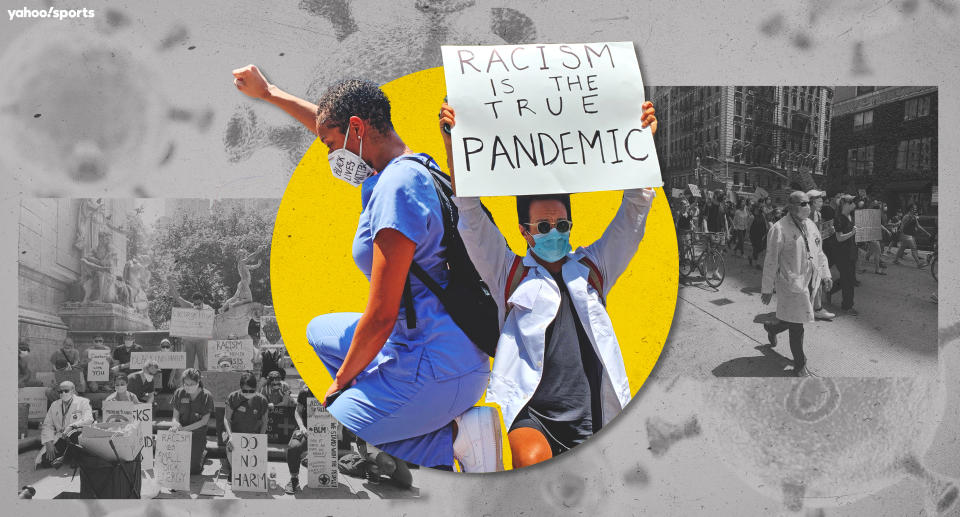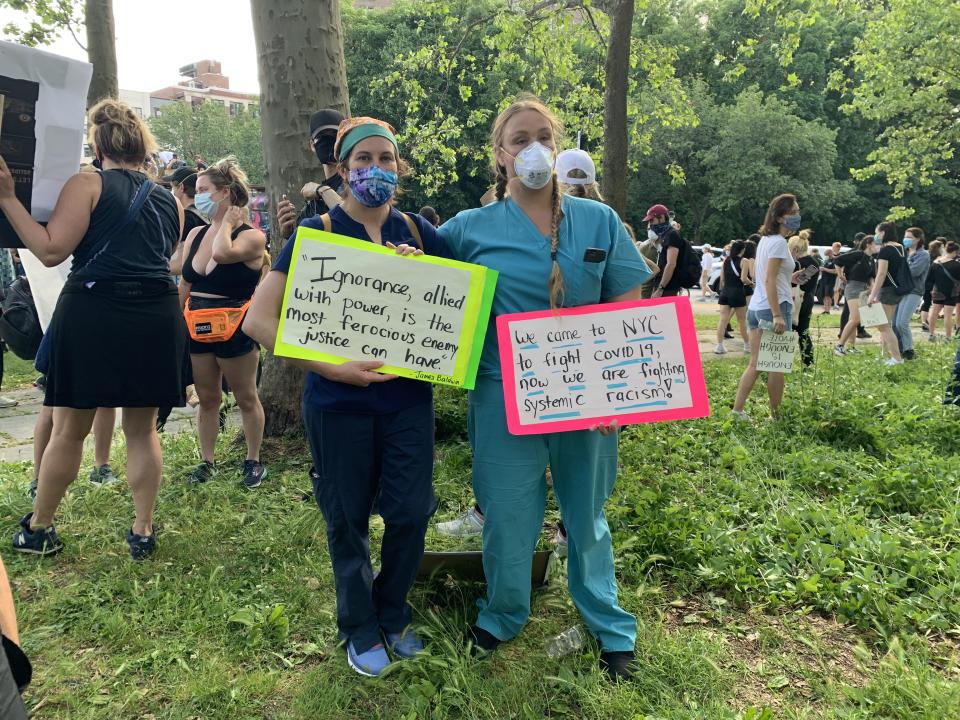Hailed as heroes, medical workers lend voices to George Floyd protests against racial injustice
NEW YORK — Two healthcare workers knelt on the sidewalk along Brooklyn’s Atlantic Avenue and treated a large gash on a young man’s knee Friday afternoon. In his hands was a sign that read, “STOP KILLING BLACK PEOPLE”. He had fallen in a stampede to escape police breaking up a Times Square protest a few days before, but that hadn’t stopped him from coming out to this one.
The crowd was large enough, long enough really, that even as the medical workers swabbed and re-wrapped his wound, a continuous stream of people flooded the streets, stopping traffic and chanting “Black Lives Matter.”
The good Samaritans in scrubs work at the Memorial Sloan Kettering Brooklyn Infusion Center. They didn’t come to the protest, the protest came to them. Hearing the cheers from the roving crowd, a group of employees emerged from the cancer facility to applaud the protesters. One of the nurses noticed the young man’s bandages needed replacing as he was marching past and sprung into action.
Afterward, he resumed the march and the healthcare workers returned to their offices. “That was so beautiful,” one of them said.
A few hours later, just as New York has done every day at 7 p.m. for weeks now, people around the city applauded for the healthcare workers who have been hailed as heroes since the start of the pandemic.

After a harrowing few months of horrific rising death tolls from the novel coronavirus, New York erupted last week — not in celebration but in righteous anger. Pent-up frustration from generations of racial inequality and police brutality targeting black people — inflamed by the killing of George Floyd in Minneapolis — finally forced a nationwide reckoning. The call for justice and reform is coming from civilian protesters who have filled public spaces in cities around the country, where they’ve been met with often undue force from police and curfews from politicians.
At many of these demonstrations, the crowds include healthcare workers — sometimes predominantly and intentionally so. Often, they are the same people on the frontlines of the fight against COVID-19. Their outsized presence is not merely incidental, but rather the result of work that leaves them acutely aware that racism affects health, outraged by the physical abuses they’ve seen, and eager to leverage their lionization and lend their authoritative voices to the cause.
“We save everyone at their worst time, why are you killing us?” said Danielle Mason, an intensive-care unit nurse at a healthcare worker-specific protest Saturday afternoon in Manhattan. She explained that it is important for the public to see another profession of public servants in uniform speak out against the abuse of power perpetrated by the police.
“When we take off these scrubs, I am a black woman. And you can't ignore, just because of what you do, what's going on in the world. I would like to have that same message be delivered to the police officers: Who are you when you take off that uniform?”
Many of the medical workers expressed a sense of obligation to be on the frontline in the fight against racism as well as the coronavirus, and a hope that a city crippled by the pandemic would pay particular attention to their protests.
“I’ll take anything for leverage, anything to balance out the inequality,” says Cecilia Seo, an ICU nurse at the protest whose mask read “I can’t breathe”.
Saturday’s march for healthcare workers, down a blisteringly hot but blocked-off Sixth Avenue from Columbus Circle to Washington Square Park, was put together by a group called Frontline4Change. The organizers, who declined to speak to the media, cautioned attendees to stay hydrated, ensure their masks covered their mouths and noses, and advised that people avail themselves of New York’s free COVID testing in the days following any protest.
As the group made its way south through a city shuttered against the pandemic, a white-coated doctor urged police standing at the cross streets to put on masks she proffered. They refused.
The Frontline4Change march was one of several healthcare worker demonstrations this past week in New York alone. On social media, the hashtag #WhiteCoatsForBlackLives shows doctors and nurses at hospitals around the country kneeling for 8 minutes and 46 seconds — the length of time that officer Derek Chauvin kept his knee on Floyd’s neck.
“George Floyd died from asphyxiation from sustained pressure to neck NOT hypertension or heart disease,” read one of the signs at Saturday’s march.
Floyd’s death, and his last words, are reminiscent of Eric Garner’s death at the hands of the police in 2014 on Staten Island.
“Eric Garner suffocated and passed out. No one did CPR on him. All the policemen are trained and certified in CPR. They looked at the guy and did nothing about it. George Floyd the same,” said Dr. Gabriel Sara, medical director of the Chemotherapy Infusion Suite at Mount Sinai, during the protest on Saturday.
With a “Black Lives Matter” pin on his white coat, just below the stitching of his prestigious title, Sara was outraged at videos showing casual police disregard for the safety and well-being of citizens.
“Yesterday morning they pushed that old man who fell on his head and bled from his ear, and they were walking by. It’s insane,” he said, referring to an incident in Buffalo.

The failure of the police in juxtaposition to the efforts of healthcare workers was a common refrain on Saturday.
“It is a privilege to be a healthcare worker, just as it’s a privilege to be a police officer, a public servant in general. We have a duty to respect and serve the public,” said Maryam Smith, a nurse from Pennsylvania, who was proud to be in New York for the protests. “You should never lose sight that you are privileged and people are trusting in you to help them.”
Smith came to the city to fight COVID-19. As our understanding of the pandemic has deepened, it has become clear that it disproportionately affects black communities.
“I’ve been a COVID nurse for months now and I’ve had one white patient,” said Kassandra Rice, another travel nurse who came from New Orleans to aid the NYU Langone Health system during the pandemic.
On Thursday, Rice attended a protest at Grand Army Plaza in Brooklyn with Lauren Frisk, a nurse from Lake Tahoe, who also came to the city to serve an ICU battling the pandemic. Frisk said that initially the situation in New York was unlike anything she had seen in healthcare before, with conference rooms and hospital basements converted to care for COVID-19 patients.
That strain hospitals felt at the height of the pandemic also highlighted how people in power express priorities through action — and money. New York’s early failures to control the coronavirus and outfit frontline workers with necessary personal protective equipment have been thrown into sharp contrast for healthcare professionals now encountering the vast, generously funded police forces patrolling the city in pricey riot gear.
“Even two weeks, a month into the pandemic happening, we still didn’t have PPE and yet you see the militarized police force covered in all kinds of gear that cost millions of dollars. And, you know, our stuff is cheap, it's $5 for a gown, it's $3 for a mask and we didn't have that,” said Dr. Preethy Subramanian, an anesthesiology resident physician.
“It feels like a stab in the back.”
Frisk is scared that the protests could spark a resurgence of COVID-19 cases in the city, but the new cases have been dropping off lately while the plight of black America has reached a boiling point.
“I’m a white American, I already have a huge position of privilege, and that’s why I feel like it's my responsibility to use my voice to uplift the voices of others who haven't always had a voice,” she said. “If the additional respect I get as a healthcare worker is part of that, then that's maybe why I'm out here in my scrubs. We're getting a lot of attention right now, we're getting called heroes, but these people [protesting] are heroes too.”
“And also hopefully we don’t get brutalized,” Rice said. “Hopefully this gives me a better chance.”
——
Hannah Keyser is a reporter at Yahoo Sports. Have a tip? Email her at Hannah.Keyser@yahoosports.com or reach out on Twitter at @HannahRKeyser.
Read more from Yahoo News:

 Yahoo Finance
Yahoo Finance 
